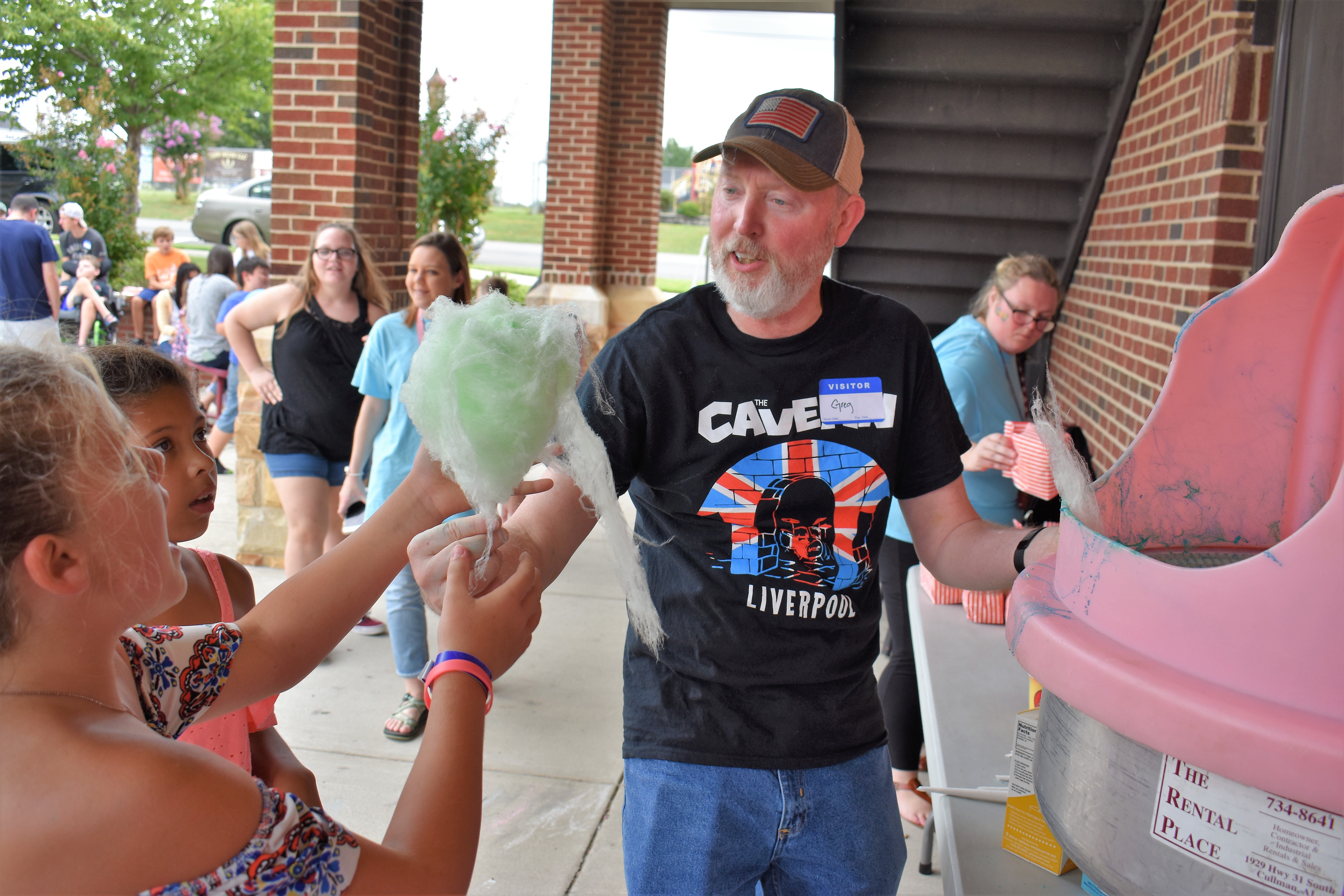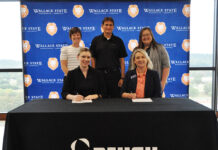In the kids’ activity area outside, Circuit Judge Gregory Nicholas demonstrates his cotton candy skills.
CULLMAN – On Saturday morning, around 100 current and prospective foster parents met in Christ Hall at St. John’s Evangelical Protestant Church for the Cullman County Department of Human Resources’ (DHR) first ever Foster Care Expo. While kids enjoyed inflatables, games and sidewalk chalk outside, families learned more about what it takes to be a foster parent.
Cullman County currently has 168 children and teens in foster care, with a total of only 47 foster homes. Many homes take in multiple children, but 39 percent of Cullman’s foster kids have to be housed in other counties due to a lack of places in Cullman County.
At an awareness event this past spring, DHR Program Supervisor Amanda Buchanan told The Tribune, “Whenever kids have to come into care, we’d rather them be in a home that’s close to where they were already living, ideally continuing to go to their same school, you know, change their environment as little as possible. But if the resource is not available, sometimes it’s not possible.”
From the inside
Maybe the most powerful statement to be made about the foster care system, and about the need for local placement, would come from a kid inside that system, and that is what The Tribune found. “Skye” (name withheld) entered the system when she was only 10 years old, a frightened and depressed child who bounced around homes in surrounding counties before finally getting the chance to be placed close to home. For her, that made a world of difference.
Note: this interview transcript has been redacted for specific information that could potentially be used for identification.
Skye entered DHR foster care after her mother disappeared for several days following a family member’s birthday celebration. When her brother fell ill and slipped into a diabetic coma, neighbors heard the commotion of the children in the home trying to awaken their brother, and they contacted emergency services. DHR was called in at that time. Her mother was eventually located in another county and contacted, but still took several more days to come home. When she did, she was arrested.
On the first day of her ordeal, Skye related, “That night, we stayed at the house with our godmother; she came and stayed with us. And then, the next day during school, we were called up to the office, and we were told, ‘This is (…)’–that was my first social worker–‘and she’s going to be taking y’all to the DHR office.’ And so, that was the first day, when we were taken away.
“Since then, I have been in hospitals for my anger and suicidal thoughts, because I was so distressed. I wanted to be with my mom. I didn’t know what was going on. And I’ve been in several foster homes because of trust issues and, you know, just hurt and pain. And I’ve been in group homes.”
Buchanan told The Tribune that the kind of emotional turmoil Skye experienced isn’t unusual, saying, “Every child that enters foster care has experienced some kind of trauma. And when they experience that trauma due to coming into foster care, they’ve also experienced loss. And therefore, when we see their response to that, it comes out in anger, inability to focus, other things like that. So it’s very often.”
For four years, Skye moved around from placement to placement in family and group homes in surrounding counties, away from family, friends and familiar surroundings. In 2015, though, she received a placement that allowed her to return to Cullman County to a setting that felt more like home and in which she was able to have more contact with her siblings.
After her return, said Skye, “I realized, like for me personally, it’s like I became more anchored, because this is where my family was, my siblings . . . they’re all around here. And so, for them to be here and me far away, that was very stressful, because I really don’t get to see my siblings that much. And, since I’ve been here, I’ve been able to see them and talk to them a lot more.
“And so, it’s like a main factor, because if you’re from Cullman and your family’s in Cullman, but you get placed somewhere else, you feel distance. You feel like the outcast, because you’re not here, you’re not being able to see them as much.
“That’s a major need here in Cullman: families that are willing to take sibling groups, families that are willing at least to take someone that has a sibling group, but be able to meet with those (siblings) a lot more.”
Since her return to Cullman County, Skye has been active in school and in community service projects. She has joined clubs and has received multiple awards and honors. She is entering her senior year in high school now and has already made plans for several years beyond.
“Being here has progressed me a lot,” said Skye, “because I’ve done those community services and awards; I’ve done that ever since I’ve been in Cullman County. It’s all because I got more support of the family, and also (I am) closer to my social worker, and she’s able to help me out a lot more. It’s a real need, to be here in Cullman County.”
DHR Dream Council
Among her other achievements, Skye has become an ambassador for the foster system, representing DHR to other kids, and other kids to DHR. She is an Alabama DHR Dream Council Ambassador, traveling the state to meet with other foster kids between 14 and 20 years of age, to discuss what is working and not working for them. From those discussions, ambassadors present information to DHR that will hopefully make the system more helpful and less stressful for kids coming into the system.
Ambassadors also inform the older kids about DHR-funded grant programs that can pay for a college education, including tuition, fees, room and board. Additionally, they work to help kids develop the life skills they will need when they leave home and leave the system.
Skye said, “We try to get the word out that we’re here for them. We’ll try to change something if it’s not really working, especially if it’s several things that keep occurring. We’ll try to talk to them and get the information out from them.”
Success story
Said Skye, “So, going from losing your mother to not knowing where she’s at, not even knowing if she’s alive–no one even knew if she was alive–to becoming a senior. I was told by my mother, and by several other people, by the time I was a senior–which they didn’t even believe I would even become a senior and even graduate–that I would end up dead, or I would end up pregnant or a dropout.
“And from hearing that to saying, ‘I am an ambassador of the state of Alabama.’ I am making a difference. I am going to graduate this year. I made it to my senior year without dying, without getting pregnant, without dropping out, to having DHR support–you know, making it.
“And being a part of first generation. My oldest brother (name omitted), he’s a first generation: he was the first one to make it to 10th grade, the first one to make it to 11th, to 12th; to make it to a college–community college, graduate community college, go on to a four-year–and not just any four year, but (a major university). He has a 4.0 GPA. And, being a part of that family, and he started the trend of a new lifestyle, and I’m following in his footsteps and starting a new life for myself.
“And so, to be a part of that, from a little girl 10 years old that didn’t know what was going on, to someone who’s now helping other youths, to someone that is now going to be graduating high school, going to college, moving forward. It’s just amazing, and it’s all because of DHR.
“DHR saw a little girl, saw her and her siblings that were hurt and were in pain, and they saw that we need to help them. So they took us and they pushed us forward, and for them to do that is really amazing.”
Though she could officially emancipate herself and leave the DHR foster system at age 18, Skye plans to remain until she is 21, so she can take advantage of a combination of Pell Grants and DHR scholarships that can pay for college up to age 26. That would allow her educational benefits for up to eight years, the same amount of time it will take for her to complete her intended undergraduate and graduate studies to become a veterinarian.
“It’s like they want you to succeed,” said Skye. “They will help you to succeed, if you’re willing to put in the effort. And I put in the effort because–one, they kept pushing me: ‘Skye, you’ve got to do this,’ ‘Skye, you’ve got to do this. You’ve got to move forward. You’ve got keep that trend in the family, you’ve got to keep that first generation going.’
“And so I just kept pushing forward, and look where I am. I am here at a foster parent recruitment event, and I am speaking. I am getting out there, getting out the word, the need, the want to help foster kids.
“In 2014, there was 4,789 children. As of now, since 2014, there’s 7,851 students just in the state of Alabama. That number has risen. And the majority of that is foster youth (as opposed to those who have been adopted). And so, that’s why I strongly like to be an ambassador, because I get to speak on their behalf. I get to go across the state of Alabama, I get to go to other states and speak to people about becoming foster parents, about helping other people. And it’s just amazing that I got the opportunity.”
After a recent rededication of her faith, Skye found even more reason to share her experience with others, saying, “I get to show them that there’s a better way, a better life. Let DHR help you. I know where you’ve been. It’s just amazing and I love it, and I just hope to continue and grow in it.”
Social Worker Margaret Berman, who sat in on The Tribune’s meeting with Skye and Buchanan, shared, “I just want to say, not only myself, but I think all of us at Cullman County DHR have been blessed enough to watch Skye grow into a beautiful young lady, very motivated, and we’re just super proud of her. All of our kids, actually, we’re very proud of.”
What does it take to become a foster parent?
Said Buchanan, “The main requirement is to have the ability and desire to provide the type of care needed by the children served.”
Foster families can take in one or more children, up to a maximum of six.
DHR requirements include:
- Foster parent must be at least 19 years of age.
- Foster home must have enough space for the child and his or her belongings.
- All members of foster family must be willing to share their home with a child who needs care.
- All members of foster family must be in good health.
- All adults in the home must be willing to undergo a thorough background check, including criminal history.
Foster care applicants must complete a 10-week, 30-hour preparation course, and their homes must conform to Alabama Minimum Standards for Foster Family Homes. The standards will be explained and reviewed during the applicant’s training. If you apply, home visits will be scheduled to assure your home meets the requirements.
The only cost to the applicant is any improvements needed to make the home meet minimum standards and the cost of completion of any medical forms.
Children in foster care and foster families have social workers assigned to them to support the placement and to access necessary services. Children will receive Medicaid to cover healthcare expenses. Through DHR, foster parents can find additional training opportunities and access a local Foster Parent Association. Families receive a payment each month for room and board, and for foster parents who are employed or in school, daycare assistance is provided.
The final word
After the expo on Saturday, Buchanan said, “I feel like it was truly a success, and it was a community project. We had many community members, businesses. A special thanks to the Cullman Rotary Club and to Catherine Morgan with State Farm, and St. John’s for the facility. Many vendors donated door prizes that helped with the turnout. So, I feel like it was a success, and it was not just a Cullman DHR event. It was a true community event.”
A little later, Buchanan added, “Cullman DHR thanks the Link of Cullman County, Cullman Shopper’s Guide and The Cullman Tribune for their part in assuring the people of Cullman knew about today’s event.”
Skye said, “From a child that was 10 years old, with her siblings to come into DHR and be super angry, to a child that is now advocating for other children, someone that’s going to be graduating, and all because of DHR, I would strongly encourage being a part of that, being a part of the process of watching someone grow, especially the youth.
“And I really strongly encourage you to, if you can’t take people into your home, become a mentor. Just find out any way that you can to be a part of something great, and let’s just change the statistics of the numbers. Let’s bring them down, let’s bring more adoptive parents and more foster parents. Let’s change the world!”
For interested families
Anyone interested in fostering, or just in getting more information about DHR fostering and adoption opportunities, call Amanda Buchanan at 256-737-5343, Callie Smith at 256-737-5387, Christy Webb at 256-737-5342 or Leah Miller at 256-737-5348. Anyone interested in mentoring can contact Gina Davis at 256-737-5305.
Copyright 2018 Humble Roots, LLC. All Rights Reserved.



























